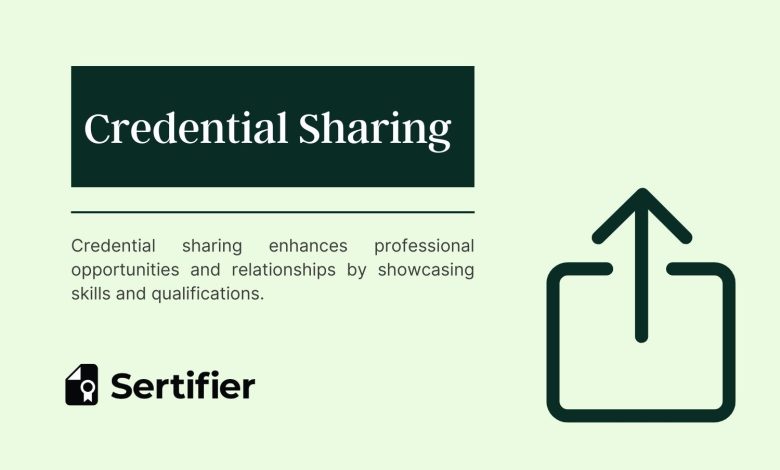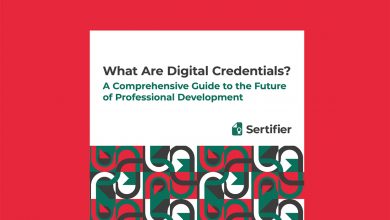What Is Credential Sharing and Why It Is Important?

Table of Contents
Introduction
The business world is becoming increasingly competitive, and it is of great importance for professionals to market themselves in the best way possible to be successful. Credential sharing and qualifications are a cornerstone of this marketing. In this article, we focus on understanding how important this phenomenon, which we call “credential sharing,” is from the perspective of individuals and employers and identifying why it is becoming increasingly important.
Certifications and qualifications contain important job-related information about the individual, such as education, experience, skills, and achievements. Effective communication of this information plays a vital role in individual job placement and helps employers make the right choices. Credential sharing and qualifications can occur across platforms such as professional networks and job applications. Professional networking platforms such as LinkedIn are just one of the places where these shares arise.The following parts of the article will examine how digital credentials and qualifications can be effectively shared through these platforms and used in job search processes. The importance and rise of skills-based hiring alongside traditional CVs will also be discussed. This is a critical issue in the modern business world and will be discussed in detail in this article. We will explore our theme even more deeply by closely examining why credential sharing and competencies are so critical.
Why is Credential Sharing Important?

Credential sharing and competencies are vital in today’s business world and are considered critical for many reasons. In this section, we will emphasize the importance of credential sharing and examine in detail the role and advantages of this process in the business world.
Creating a Professional Image
Credential sharing and qualifications on the right platforms strengthen the individual’s professional image. Through these posts, employers and other professionals learn about the individual’s education, experience, achievements, and skills. This increases the individual’s level of credibility and expertise and helps them gain respect in the business world.
Increasing Business Opportunities
Openly credential sharing and qualifications can increase job opportunities. During the job search process, employers usually determine suitable candidates by examining the professional profiles of the candidates. A clear presentation of qualifications, experience, and achievements can help employers better evaluate and select candidates for the correct positions.
Strengthening Business Relationships
Credential sharing and competencies are essential to strengthen professional relationships. Effective communication and collaboration in business depend on sharing your experiences and competencies with others. Communicating your credentials and qualifications with business partners, potential employers, and colleagues can strengthen business relationships and increase your access to future job opportunities.
Information Sharing and Innovation Promotion
Credential sharing and competencies encourage knowledge sharing and support innovation. Sharing knowledge and opinions of individuals with different experiences and expertise can help emerge new ideas and perspectives. This promotes the development of new projects, strategies and solutions in business.
Learning and Development Opportunities
Credential sharing and competencies can increase individuals’ access to continuous learning and development opportunities. The opportunity to learn from other professionals’ success stories and experiences can help individuals advance their careers and achieve their goals.
The importance of credential sharing and competencies is emerging as a critical tool for effectively promoting oneself in the business world and building professional networks. These shares can form the basis of successful careers and business relationships. Therefore, understanding the importance of credential sharing is essential for modern professionals and will be discussed in more detail in this article.
Credential sharing on LinkedIn

LinkedIn is among the most effective and widely used professional networking platforms. It provides an environment where professionals, job seekers, and employers connect, share experiences, and explore job opportunities. In this section, we will discuss how credentials and qualifications can be effectively shared on platforms such as LinkedIn and the advantages of such sharing.
Creating and Updating a Profile
The first step in credential sharing and LinkedIn qualifications is creating a comprehensive profile. Elements in your profile, such as basic information, educational background, work experience, skills, and achievements, should reflect your professional identity. Additionally, updating this information on a regular basis allows the latest news and achievements to be shared.
Connecting and Networking
LinkedIn offers the opportunity to connect and network with other professionals. These connections are essential for career development and play a significant role in credential sharing and competencies. Gaining links from related industries and fields can help you connect and share knowledge with experts in your area.
Content Sharing and Participation
LinkedIn is an excellent platform for sharing content. You can share your credentials and qualifications with a broad audience through articles, videos, and posts. At the same time, you can follow the developments and latest news in the sector by following the content of other professionals and participate in these contents by adding your comments.
Joining Groups and Participating in Discussions
LinkedIn offers many groups for different industries and interests. By joining these groups, you can follow content that suits your interests, participate in group discussions, and share your ideas. This is an effective way to demonstrate your credentials and competencies within the group.
Reference and Approval Requests
LinkedIn offers the opportunity to get testimonials and endorsements. Getting testimonials and endorsements from your connections allows you to demonstrate other professionals’ opinions of you and your credentials. This is a way to increase your credibility and strengthen your professional reputation.
LinkedIn is a powerful tool for creating and sharing professional identity. Effectively communicating your credentials and qualifications on this platform can strengthen your presence in the business world, increasing your access to job opportunities and business relationships. Therefore, proper use of media such as LinkedIn is of great importance for modern professionals. This concept, which will be discussed more deeply in this article, emerges as a critical tool to strengthen your interactions in the business world.
Credential sharing via CV’s

It is one of the most essential documents in the job search process. This document contains the credentials and qualifications of an individual, such as education, work experience, skills, qualifications, and achievements. CVs are critical for employers to evaluate and select suitable candidates. This section will discuss how credentials and capabilities can be effectively shared through CVs and the advantages of such sharing.
Attractive Title and Summary
The title and summary at the top of the CV are essential to highlight an individual’s credentials and qualifications. The label should clearly state the individual’s profession, area of expertise, and goal. The summary section summarizes the main achievements, experiences, and talents of the individual’s career. These sections help employers quickly understand an individual’s qualifications.
Clear and Sufficient Information Presentation
Each section in the CV should provide clear and sufficient information. Education, work experience, skills, and other headings should detail the individual’s achievements and qualifications in these areas. Dates, titles, projects, and further essential details allow employers to understand an individual’s background and qualifications.
Success-Oriented Language Use
The CV should be prepared with the use of success-oriented language. The individual’s achievements, impact, and contributions to duties should be highlighted. For example, achievements such as how the individual managed a project, what value he added, and how he influenced his team should be clearly stated.
Specifying References and Documents
It is essential to provide information about references and relevant documents in the CV. An individual’s concerns and qualifications provide employers with more information about their credibility and capabilities. This bolsters the CV and increases the credibility of the individual.
Customization and Target Orientation
When applying for every job, your CV should be customized. Skills and experiences appropriate to the position applied for should be emphasized. The CV should be prepared in accordance with the needs of the employer and the requirements of the work.
CVs are crucial for individuals to share their credentials and qualifications effectively. These documents are among the most critical steps in the job search process and must be prepared correctly for individuals to attract the attention of employers and gain access to job opportunities. The effective use of CVs is indispensable for building a successful career in the modern business world.
The Rise of Skills-based Hiring

The “skills-based hiring” approach, which focuses on individuals’ experiences, skills, and abilities during the job search process, is gaining more and more popularity in today’s business world. In this section, we will discuss the reasons why the skills possessed by individuals come to the fore rather than traditional qualifications and the advantages of this approach for employers and candidates.
The Role of Technological Development
Technological developments are transforming the business world, and this transformation encourages skills-based recruitment. Products such as artificial intelligence, automation, and digitalization are transforming job roles and increasing the need for specific skills in these roles. Employers are starting to focus on skills to select candidates who fit these changing needs.
Faster and Effective Evaluation
Traditional qualifications-based hiring processes can be time-consuming. However, skills-based hiring allows for quick and effective assessment of candidates’ skills. This helps employers make faster decisions and identify suitable candidates.
Making Individuals’ Various Abilities Visible
Skills-based hiring allows candidates to highlight their diverse abilities. Skills not mentioned in traditional CVs become more visible with this approach. This way, employers can evaluate a broad range of candidates’ skills rather than focusing on just one specific experience.
Performance Based Evaluation
Skills-based hiring is based on measuring candidates’ actual performance. Simulations, tests, and project-based assessments allow candidates to demonstrate their skills directly. This provides employers with the opportunity to evaluate the potential of candidates better.
Openness to Learning and Development
Skills-based hiring emphasizes candidates’ openness to continuous learning and development. In the changing business world, it is of great importance how open the candidates are to learning and acquiring new skills. By evaluating this opening, employers can gauge candidates’ long-term potential.
Skills-based recruiting is becoming a more accepted approach in the modern business world. This approach can help employers make more effective assessments, better demonstrate candidates’ potential, and adapt to rapid change in the business world. The rise of skills-based hiring will shape future hiring processes and play an essential role in helping individuals advance their careers. Therefore, understanding and using this approach may be the key to success in today’s competitive business environment.
Conclusion
The rise of skills-based hiring is an essential milestone in adapting to the rapidly changing dynamics of today’s business world and building a successful career. This article covered critical elements of the modern job search process, focusing on how credentials and qualifications can be shared effectively.
Credential sharing and qualifications through professional networking platforms such as LinkedIn and CVs play a crucial role in strengthening the professional image and increasing job opportunities. At the same time, the rise of the skills-based recruitment approach allows individuals to showcase their true talents and potential better while providing employers with an essential guide to selecting the most suitable candidates.
The rapid advancement of technological developments changes the needs and job roles in the business world, accelerating the adoption of a skills-based recruitment approach. This approach is essential for guiding individuals’ careers, strengthening their professional networks, and making it easier for employers to select the most suitable candidates.
In the future, skills-based hiring is expected to become more widespread and replace traditional qualifications-based approaches. Individuals focus on constantly learning, developing, and updating their skills will be critical to their success in this changing business world.
Effectively, credential sharing and qualifications and adopting a skills-based recruitment approach are critical for modern professionals. Understanding these elements and using these concepts effectively is the key to building a successful career and making the most of opportunities in the business world.



